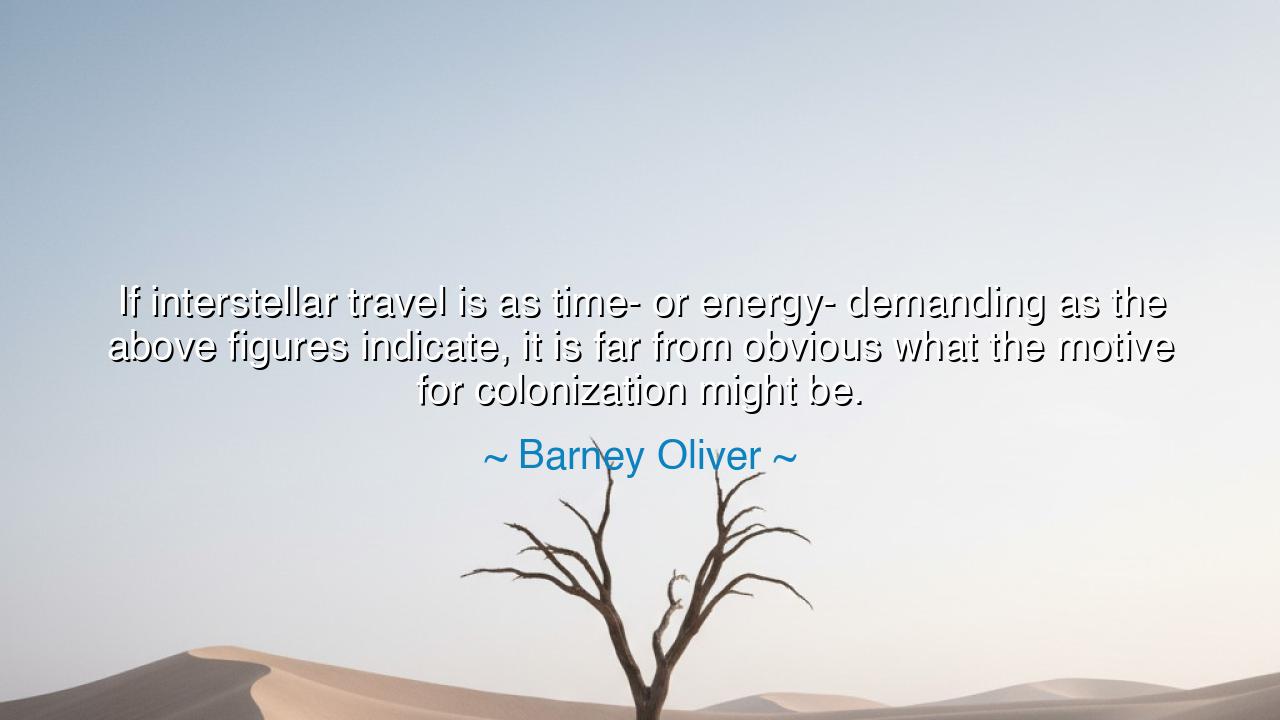
If interstellar travel is as time- or energy- demanding as the
If interstellar travel is as time- or energy- demanding as the above figures indicate, it is far from obvious what the motive for colonization might be.






Barney Oliver, scientist and seeker of cosmic truth, once observed with sobering clarity: “If interstellar travel is as time- or energy- demanding as the above figures indicate, it is far from obvious what the motive for colonization might be.” These words, though born in the age of modern astronomy, ring with the cadence of ancient wisdom. For they remind us that the stars, though beautiful to the eye and beckoning to the spirit, are not easily won. To reach them is to wrestle with forces far beyond our human scale—time that stretches into centuries, energy that dwarfs our greatest fires, and the question of why we would attempt so daunting a feat.
The ancients themselves gazed upward and wondered. The Babylonians charted the stars with patient care; the Egyptians aligned pyramids with Orion’s belt; the Greeks told tales of gods dwelling among the constellations. To them, the heavens were not merely physical lights, but symbols of aspiration. Yet even they knew that some dreams, though radiant, could devour the dreamer if pursued without wisdom. Oliver’s words are the modern echo of this ancient caution: it is not enough to yearn for the stars—we must also ask what compels us, and at what cost.
History gives us mirrors of this dilemma on Earth. Consider the age of oceanic exploration, when kingdoms sent ships to the ends of the seas. The voyages demanded vast treasure, cost countless lives, and consumed decades. The motive then was clear: spices, gold, land, and glory. But if the cost of reaching other stars exceeds any imaginable gain, what motive remains? Oliver’s wisdom is a challenge: if colonization of other worlds is more toil than treasure, more burden than blessing, perhaps the true motive must rise higher than wealth.
There is also in his words a veiled critique of human ambition. Too often we strive to conquer not out of necessity but out of restlessness, out of the pride that says, “Because it is there.” Yet Oliver asks us to pause: if the stars cannot easily be reached, then perhaps colonization is not destiny but illusion. He forces us to weigh not only what is possible, but what is purposeful. For without purpose, even the grandest achievement is hollow, and without clarity, even the greatest sacrifice may be wasted.
And yet, the human spirit has always answered difficulty with defiance. When told that flight was impossible, the Wright brothers lifted their fragile craft into the wind. When told that the moon was beyond reach, Armstrong and Aldrin set their feet upon its dust. Perhaps, then, the motive for interstellar travel is not material at all—it may be the eternal human hunger for discovery, the desire to ensure survival beyond a single world, the dream of becoming more than we are. Oliver’s caution is wise, but it is also a spur: to seek the stars, we must find a motive higher than profit, greater than conquest—something worthy of centuries and suns.
The lesson for us is this: before seeking distant horizons, be sure of your reason. Do not chase after impossible goals merely for vanity, but anchor your striving in purpose. On Earth as in the stars, ask first: why do I labor, why do I sacrifice, what is the meaning behind the journey? For if the answer is shallow, the burden will break you. But if the answer is deep, even centuries of toil may be borne with honor.
Practically, this means cultivating clarity of purpose in our own lives. Whether building a career, raising a family, or pursuing a dream, weigh the cost against the meaning. If you must spend much time and much energy, be sure that the goal is worthy of both. Like the explorers of the past, and like the starfarers of the future, your motive will be your compass, guiding you through hardship and giving strength when all else is spent.
Thus, Barney Oliver’s words are not merely a scientific musing, but a timeless teaching: great journeys demand great reasons. The stars will not yield to us easily. Neither will the great challenges of our own lives. But if we find a purpose strong enough—one that transcends comfort and endures through hardship—then even the farthest worlds, whether among the heavens or within our own hearts, may one day be reached.






AAdministratorAdministrator
Welcome, honored guests. Please leave a comment, we will respond soon